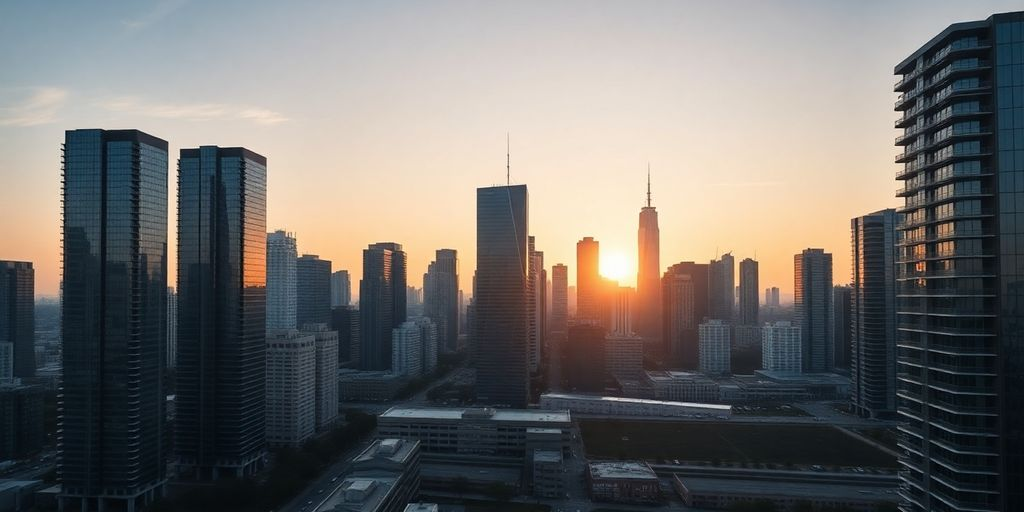The Future of New York Real Estate: Market Shifts, Demographics, and Global Influences
Blog Author - Published Date
Thinking about buying or selling property in New York? It can feel like a lot, especially with all the different neighborhoods and rules. This guide is here to help break it all down. We'll cover what makes the New York real estate market tick, from the big picture trends to the details you need to know if you're looking at new buildings or just trying to find a good rental. Plus, we'll touch on the legal and money stuff, and even what it takes to start a career in real estate here. Let's get started on understanding the New York real estate market guide.
Key Takeaways
- When looking at Manhattan real estate, remember each neighborhood has its own vibe and price point, influenced by history and current economic factors.
- Buying a new construction in NYC means looking closely at the offering plan and visiting sales galleries to get a real feel for the property.
- Deciding between renting and buying involves looking at your budget, flexibility needs, and understanding all the legal paperwork for both.
- New York real estate laws, from landlord-tenant rules to disclosure requirements, are important for both owners and renters to know.
- Starting a real estate career in New York requires specific education and getting your salesperson license, which is the first step to helping others with their property goals.
Understanding the New York Real Estate Market
New York City's real estate scene is something else, right? It’s not just about finding a place to live; it’s about understanding a whole ecosystem that’s always buzzing. Manhattan, in particular, has this magnetic pull, drawing people from all over the globe. Each neighborhood feels like its own little world, with its own vibe and price tag. Think about the difference between the bustling energy of Midtown and the quiet charm of the West Village – it’s huge.
Manhattan's Unique Appeal and Neighborhood Dynamics
Manhattan's appeal is pretty straightforward: it's a global hub for finance, culture, and entertainment. This constant influx of people and activity keeps the demand high. The way the island is laid out, with distinct neighborhoods, means you have a lot of choices, but it also means prices can vary wildly from one block to the next. Knowing these neighborhood dynamics is key to finding a spot that fits your lifestyle and budget. It’s a real mosaic, and figuring out which piece fits you is part of the adventure.
Historical Significance and Property Values
New York City, and Manhattan especially, has a ton of history, and that really shows up in the property values. Old buildings, historic districts, places with a story – they often cost more. It’s like you’re not just buying bricks and mortar, but a piece of history too. Areas with well-preserved architecture or landmarks nearby tend to see higher prices because people value that connection to the past. It adds a certain prestige, you know?
Market Trends and Economic Influences
Like any market, New York’s real estate is always shifting. Economic conditions, interest rates, and even what’s happening globally can shake things up. Sometimes prices shoot up, and other times they level out. Keeping an eye on these trends is smart, especially if you’re thinking about buying or selling. It helps you make better decisions about timing. The current market can be influenced by various factors, including changing buyer demographics.
The city's housing inventory has seen some changes recently. Statewide housing inventory saw a 3.9% increase last month, reaching 30,254 units compared to 30,254 in June 2024. This indicates a growing number of available homes on the market.
Understanding these shifts can help you make more informed choices when you're looking for a place. It’s a lot to take in, but that’s what makes the New York market so interesting. You can find more information about housing inventory on statewide housing inventory.
Navigating New Developments in New York City

Buying a place in a new building project in New York City can be pretty exciting, whether you're looking to live there or just invest. These new spots often come with all the latest gadgets, cool designs, and the chance to be the very first person to live in a space that's been put together with city living in mind. It doesn't matter if you're into the historic vibe of the Flatiron District or any other neighborhood, knowing how to buy in these new developments is key.
The Allure of Modern Urban Living
New developments really do offer a certain appeal. Think about it: you get brand-new everything, often with amenities that make city life easier, like gyms, doormen, or even rooftop gardens. Plus, the design is usually up-to-date, reflecting current tastes and building codes. It’s a chance to get into a property that’s built for today’s lifestyle, often in areas that are seeing a lot of growth and new energy. These buildings are often designed with energy efficiency and smart home technology in mind.
Key Steps in Purchasing New Construction
So, you're thinking about buying a new build? Here’s a general idea of what to expect:
- Do Your Homework: Before anything else, figure out what you can afford and where you want to be. Look into market trends and what’s coming up in neighborhoods that interest you. Think about what’s important to you – like being close to the subway or good schools.
- Find a Good Agent: Seriously, a real estate agent who knows new developments can be a lifesaver. They’ll have the inside scoop on projects, help you understand the paperwork, and can even help negotiate.
- Check Out the Building: Visit the sales office. You’ll want to see the actual units if possible, or at least get a feel for the finishes and layout.
- Review the Paperwork: This is a big one. You’ll get an offering plan, which is basically the blueprint for the sale. Your lawyer needs to go over this with a fine-tooth comb.
- Sign the Contract: Once everything looks good, you’ll sign the purchase agreement. This is a binding contract, so make sure you’re 100% sure.
- Closing Time: This is the final step where ownership officially transfers to you. It can be a bit complicated, involving lots of coordination, but then you get the keys!
Buying new construction means you're often buying based on plans and models. It's important to be patient and understand that there can be delays or changes during the construction process. Always have a lawyer review everything before you sign anything.
Understanding the Offering Plan and Sales Gallery
When you look at new developments, you'll hear a lot about the offering plan. This document is super important. It’s put together by the developer and has all the details about the building, the units, the financials, and the legal terms of the sale. It’s a thick document, and you absolutely need a lawyer to help you understand it. It covers things like the building’s budget, the reserve fund, and what happens if the project doesn’t get built as planned. The sales gallery is where developers try to sell units. They’ll have models, floor plans, and samples of the finishes. It’s designed to give you a good impression, but remember it’s a sales environment, so stay focused on the facts and what’s in the offering plan.
Renting vs. Buying in New York City
Deciding whether to rent or buy in New York City is a big question, and honestly, there's no single right answer. It really depends on what you're looking for right now and what your bank account looks like. Renting gives you a lot of freedom. If you're not sure where you want to settle down long-term, or if your job might move you around, renting is way easier. You can pack up and go without a lot of hassle. Plus, you don't have to worry about things like property taxes or unexpected repair bills. The rental market here is huge, so you've got tons of options, from tiny studios to big family apartments.
Buying, on the other hand, is a whole different ballgame. It's a commitment, for sure. You build equity over time, which is nice, and you can paint your walls any color you want without asking permission. But, buying means dealing with mortgages, closing costs, and all those ongoing expenses. We're talking about property taxes, building fees, insurance – it all adds up. It's a good idea to really crunch the numbers and see if buying makes sense for your financial situation. Sometimes, the cost of buying can be way more than renting, especially in the short term. You also have to think about how long you plan to stay in one place. If you're only planning on being here for a couple of years, renting is probably the smarter move.
Tips for Finding the Right Rental Apartment
- Know your budget: Figure out exactly how much you can afford for rent each month, including utilities. Don't forget to factor in a security deposit and maybe the first month's rent upfront.
- Location, location, location: Think about what neighborhoods work for you. Do you need to be close to work? Near good schools? Close to public transport? New York has so many different vibes in each area.
- Use your resources: Online listings are great, but don't discount rental brokers. They often know about places before they even hit the market and can help you sort through the noise.
- Be prepared: Have your documents ready, like proof of income, identification, and references. Landlords often want to see this stuff quickly.
Legal Considerations for Buyers and Renters
When you're dealing with real estate in New York, there are always legal bits to sort out. For renters, the lease agreement is super important. Read it carefully. Understand what the rent increases will be, if you can sublet, and who's responsible for repairs. Knowing your tenant rights is key to avoiding problems down the line. For buyers, it's even more involved. You'll need a lawyer to look over all the contracts, check the property title, and make sure everything is on the up and up. There's a lot of paperwork, and getting it wrong can be costly.
It's easy to get caught up in the excitement of finding a new place, but taking the time to understand the legal documents involved can save you a lot of headaches later on. Don't be afraid to ask questions or get a second opinion.
Financial Aspects of Property Ownership
Owning property in New York comes with a price tag that goes beyond just the sticker price. You've got your mortgage payments, sure, but then there are the ongoing costs. Think about monthly maintenance fees if you're buying a condo or co-op, annual property taxes, insurance, and maybe even fees for things like a gym or doorman. These costs can really add up and affect your monthly budget. It's also worth looking at urban vs. suburban trends to see how property values and taxes might differ depending on where you choose to live within the greater New York area. Making sure you can comfortably afford all these expenses is a big part of deciding if buying is the right move for you.
Essential Legal and Financial Considerations
When you're looking at real estate in New York, there's a lot more to think about than just the sticker price. You've got to get a handle on the legal stuff and the money side of things, or you could end up in a real pickle. It’s not just about finding a place you like; it’s about making sure everything is above board and that you can actually afford to keep it.
Key Real Estate Laws for Property Owners
New York City has some pretty specific rules for property owners. For instance, landlord-tenant laws are a big deal. These cover things like security deposits, what goes into a lease, how you handle evictions, and keeping the place livable. You've got to know about laws like the Housing Stability and Tenant Protection Act of 2019 and the Rent Stabilization Code. Staying on top of these regulations is key to avoiding trouble. Also, there are disclosure laws. You might have to tell potential buyers or renters about things like asbestos or lead paint. Then there are zoning laws, which dictate how you can use or change your property. It’s a lot to keep track of, and getting it wrong can mean fines or worse. It’s smart to have a lawyer who knows this stuff inside and out.
Understanding Lease Agreements and Tenant Rights
If you're renting, the lease agreement is your main document. You really need to read it carefully. Understand what the rent increases will be, if you can sublet, and what the landlord is responsible for when it comes to repairs. New York law gives renters certain rights, and knowing them helps you deal with any issues that pop up. It’s about making sure you’re treated fairly and that the landlord holds up their end of the bargain. A good lease agreement protects both sides, really.
Financing Options and Co-op Requirements
When you're buying, especially in New York, figuring out the money is a huge part. You'll need to think about mortgages, and sometimes those are jumbo loans because prices are so high. If you're looking at co-ops, they have their own set of rules and financial requirements. You might need to have a certain amount of cash saved up, and the co-op board will want to look at your finances closely. It’s not just about qualifying for a loan; it’s about meeting the specific demands of the building you want to buy into. Getting pre-approved for a mortgage is a good first step, and it helps you know what you can afford before you start looking seriously. This process can be complex, so working with a real estate agent who understands the local market is a good idea, especially when you're submitting an offer and getting ready for the contract and closing stages of buying a home in New York.
It’s easy to get caught up in the excitement of finding a new place, but taking the time to understand the legal and financial details upfront can save you a lot of headaches down the road. Don't skip the small print.
Here’s a quick look at some common financial considerations:
- Down Payment: The amount you put down upfront.
- Mortgage Payments: Your monthly loan payments.
- Property Taxes: Annual taxes paid to the city.
- Maintenance/HOA Fees: Monthly fees for condos or co-ops.
- Insurance: Homeowner's or renter's insurance.
- Closing Costs: Fees associated with finalizing the purchase.
Embarking on a Real Estate Career in New York

Thinking about a career in real estate here in New York? It’s a big decision, and honestly, it can be a really rewarding one if you put in the work. But before you can start showing properties or helping people find their dream apartments, you’ve got to get licensed. It’s not just about knowing the neighborhoods; there’s a whole process to follow.
The Importance of Real Estate Education
Getting your education right is the first big step. It’s not just about passing a test; it’s about actually learning how this business works. You’ll cover things like property laws, how financing really goes down, and what makes a market tick. Plus, there are ethical standards you need to know. Think of this education as your toolkit for success. Without it, you’re kind of just guessing, and that’s not great for clients or for your reputation.
Choosing the Right Educational Institution
So, where do you get this education? You need to find a school that’s approved by the state. Look for places that have good instructors, maybe offer classes at times that work for you (online or in person), and have study materials to help you out. It’s worth doing a little digging to find a school that fits your learning style. You can check out options for a pre-licensing course NYC to get started.
Obtaining Your New York Salesperson License
After you finish your course, the next hurdle is the state exam. Study up, take practice tests, and maybe even form a study group. Once you pass that exam, you can apply for your actual salesperson license. This is the official ticket to start working in the field. Remember, getting licensed is just the beginning; the real learning happens when you start working with clients and building your business. You can find more details on the requirements to become a real estate agent in New York on the state’s website.
Starting a career in real estate requires dedication and a solid educational foundation. It's a field where continuous learning is key to staying ahead and providing the best service to your clients.
Wrapping Up Your New York Real Estate Journey
So, you've made it through the guide. Buying or renting in New York City is a big deal, and it's definitely not always straightforward. We've talked about everything from checking out new buildings in places like the Flatiron District to understanding the paperwork for renting an apartment. Remember, knowing the local laws, like those about disclosures and tenant rights, is super important. Plus, keeping an eye on market trends and what you can actually afford makes a huge difference. Whether you're looking to buy your dream home or just find a decent place to rent, taking the time to learn the ropes and maybe getting some help from a good agent will make the whole process much smoother. Good luck out there! Contact Us
Frequently Asked Questions
What makes New York City's real estate market special?
New York City's real estate market is like a big puzzle with many pieces. Manhattan is super popular because it has cool attractions, lots of jobs, and different kinds of neighborhoods. Prices can change a lot depending on how many people want to buy and how many homes are available, plus what's happening with the economy.
What should I know about buying a new apartment in NYC?
Buying a new home means you get the latest designs and cool features. You'll need to do your homework, like checking out the neighborhood and figuring out your budget. You also need to read something called an 'offering plan,' which is like a detailed report about the building, and visit the sales office to see model homes.
How can I find a good place to rent in New York City?
Renting is a good choice if you want more freedom or are just starting out. You should first decide how much you can spend and where you want to live. Look online for places and go see them. You might also want to get help from a rental agent. Make sure you understand the lease agreement before you sign it.
What legal stuff do I need to know when buying or renting in New York?
When you buy property, there are important laws you need to follow, like rules about telling buyers about any problems with the property and rules about how buildings can be used. Lease agreements for renters also have specific rules about rent, repairs, and what you can and can't do. It's smart to have a lawyer help you understand all the paperwork.
What are the money matters I should consider with New York real estate?
Besides the price of the home, you'll have ongoing costs like property taxes, insurance, and maybe fees for things like a gym or pool in your building. You can get loans to buy a home, but co-ops (where you own a share of the building) have their own special rules for getting loans.
How do I start a career in real estate in New York?
To work as a real estate agent in New York, you first need to take classes to learn about the business. Then, you have to pass a test to get your license from the state. Picking a good school and studying hard are key to starting your career.














